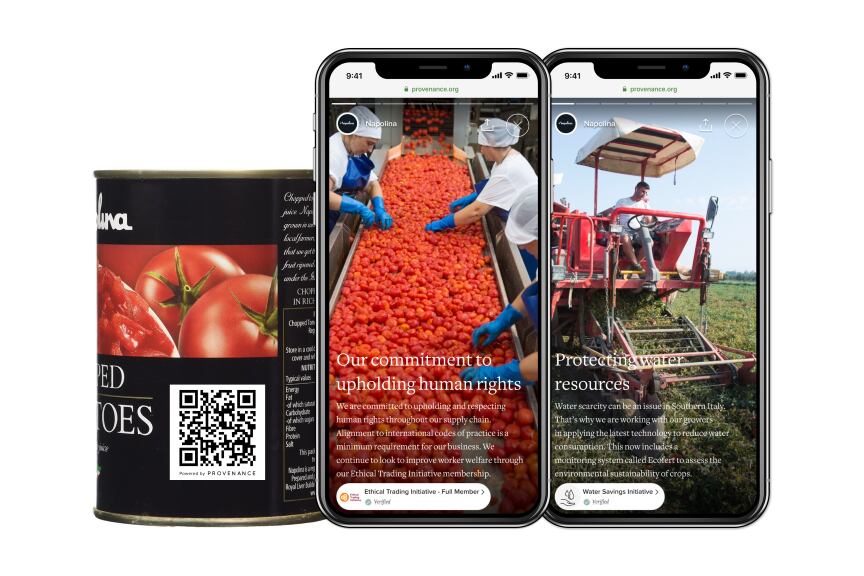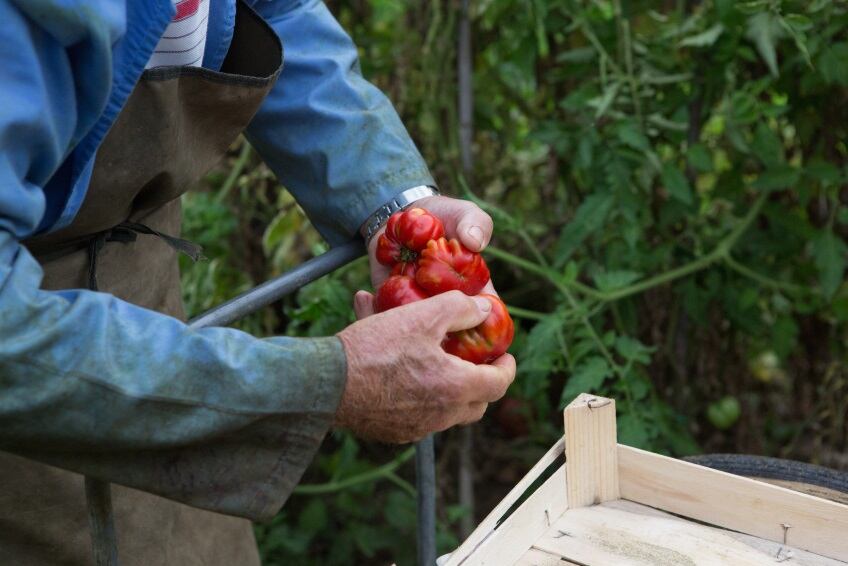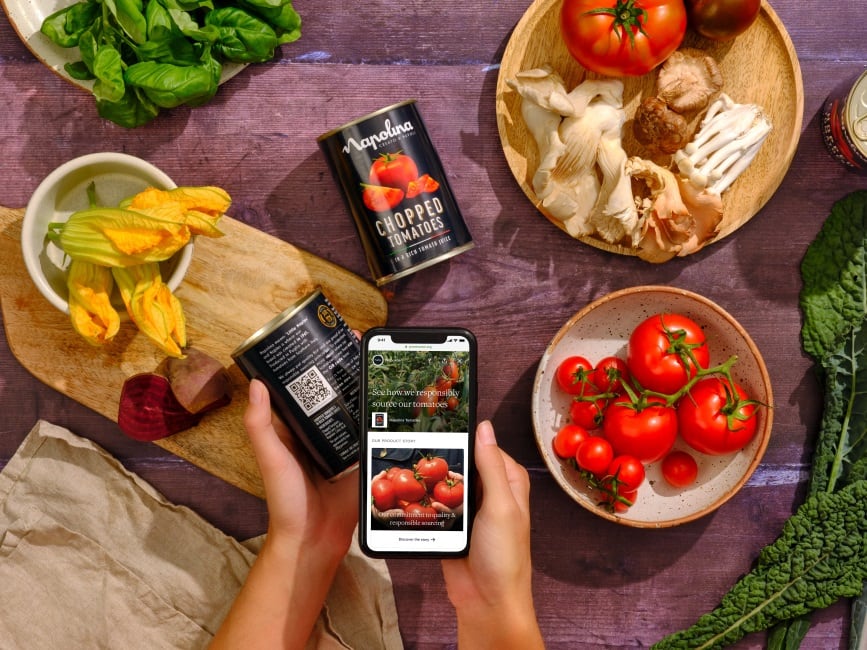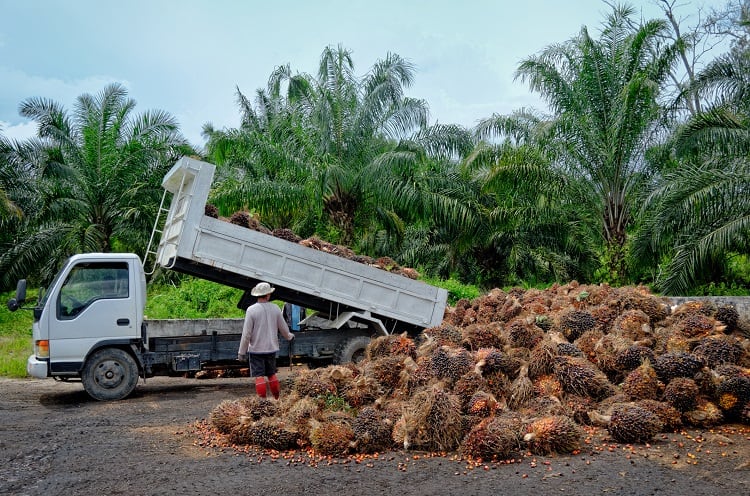Princes is introducing on-pack Quick Response (QR) codes for its Napolina tinned tomatoes, allowing consumers to access ‘the story behind the products’ – the ‘impact and journey’ – from farming cooperatives to supermarket shelves. Working alongside traceability start-up Provenance, the initiative has also seen the launch of a new ‘responsible sourcing’ webpage, to provide further insight into Napolina’s product story.
“By giving shoppers meaningful assurance on our brand values of transparency and our sustainability efforts, we can build trust and loyalty. Through the on-pack QR codes, we are engaging shoppers with a mobile-friendly experience that is supported by data from our supply chain and the Provenance platform,” Neil Brownbill, Italian Products Commercial Director, commented.
“Our consumers can now clearly see how these products are made, where they come from and who was involved. The Provenance partnership will also provide us with a greater understanding of the particular areas our customers care about, alongside a stronger feedback loop to inform our future efforts in this area.”
The systems and webpage aim to be a ‘consumer-friendly’ way of communicating the environmental and social impact of the products. This, Princes hopes, will mean consumers and customers can ‘better understand the impact behind what they’re buying’.
The drive for transparency: ‘Consumers want to know more’
The initiative is part of Princes’ wider ambition to enhance trust and transparency across its brands, from canned tomatoes and seafood to juices.
The strategy has been developed in partnership with Provenance using software enabled by blockchain, mobile and open data.
At this initial stage, Provenance’s software gathers and presents information and stories about Napolina’s products and supply chains in a ‘Product Passport’, including verified data to demonstrate that the claims are accurate through a ‘Proof Points’ feature.

This level of enhanced transparency is rapidly becoming the norm, Brownbill told FoodNavigator.
“The horsemeat contamination of EU beef supply chain took everyone by surprise and fundamentally challenged assumptions about the integrity of food supply chains. Today, consumers want to know more about what ingredients are going into their food and drink, where they originate from and if they are ethically and sustainably sourced. We expect this trend to continue, and we are fully committed to unlocking greater supply chain transparency to meet that demand and build trust,” he suggested.
Provenance founder and CEO Jessi Baker agrees that heightened expectations around traceability and transparency – as well as products that are more sustainable or ethical - are mainstreaming and believes that this will empower consumers.
“There is significant growth in the market for products labelled as ‘sustainable’ and ‘ethical’ – but the next iteration of this is transparency with integrity,” she predicted.
“Citizens are expecting brands to be more open so that we can all make more conscious, informed purchasing decisions. This partnership with Princes is about helping get the information into the hands of shoppers and creating a more honest dialogue about the work that’s being done and in progress towards a more positive food system.”
Combating illegal labour in Italian agriculture
Princes’ transparency efforts build on the work the company is already undertaking to promote ethical practices across its supply chain.
Princes processes around 250 million tomato products each year at its Foggia facility, across the full Napolina brand portfolio, as well as own-brand products.
When it comes to tomatoes, there is a particular connection to conditions in Italian agriculture and one of the major challenges it faces is the use of illegal labour.
The company has already launched various efforts to tackle ethical issues, such as labour abuses in a system that is heavily reliant on migrant workers. According to government estimates, migrant labour accounts for up to one-fourth of the total agricultural workforce in the country.
At the end of 2018, Italy’s Chamber of Deputies' Joint Committees XI (Labour) and XIII (Agriculture) began an investigation of the so-called ‘caporalato’ phenomenon - a form of illegal intermediation that exploits migrant workers, violates minimum wage requirements and imposes 'inhumane' working conditions.
“The issue of illegal labour in Italian agriculture is one that has existed for many years. As such, we have built capacity and awareness in our supply chain by providing training and guidance to direct suppliers and growers on ethical compliance and conducted over 4,000 in-field inspections in our supply chain. We also have complete visibility of the movement of tomatoes during the annual harvest traceable through a GPS system installed on our trucks,” Brownbill explained.
In 2018 Princes announced its intention that 100% of the tomatoes processed from its Italian supply chain would come from farms with independent ethical accreditation, through either Global GAP with GRASP assessment or SA8000 certification. Global GAP is the worldwide standard for agricultural practice and GRASP is a voluntary, ready-to-use module, developed to assess social practices on farms, including workers’ health, safety and welfare, contracts, wages and freedom of representation.
Beyond accreditation, since 2013 Princes has held ‘several ethical forums for suppliers in Italy’ to raise awareness. These events have attracted delegates from UK and European retailers, political stakeholders and the Ethical Trading Initiative (ETI).
“Princes has attended and spoken at several multi-stakeholder ethical roundtable events in Italy in recent years to highlight issues in Italian agriculture and demonstrate our approach. We frequently call on all stakeholders to undertake due diligence of their supply chains, and this is not limited to tomatoes, but also to the many other agricultural crops from southern Italy,” Brownbill elaborated.
Princes’ also supports collaborative efforts to tackle the problem of illegal labour practices in the country. In collaboration with on-the-ground charity Caritas, the group has launched the Lavoro Senza Frontiere (or 'Work Without Borders') scheme to find roles at its PIA factory for victims of modern slavery in southern Italy.
Princes has also introduced initiatives to provide growers financial stability. “In 2019, we signed a partnership agreement with leading Italian agricultural union Coldiretti, providing tomato growers with long term contracts at prices endorsed by Coldiretti, providing a fair and profitable return to growers. Growers also have access to grants and financing opportunities as part of the agreement.
“This financial stability is crucial in ensuring growers can provide safe and fair employment to its workforce, and provides a significantly reduced risk of unethical practices. The agreement is also seeing growers implement environmental improvements and commit to participating in a blockchain programme.”

Blockchain the 'next step' on Princes' ethical sourcing journey
In this context, Brownbill suggested that the new blockchain initiative is a ‘natural next step’ for Princes.
“Princes has long taken a proactive approach on tackling illegal labour in Italian agriculture and we consider ourselves to be a leading voice on this issue. This initiative is an important, natural next step in broadening the transparency of this work and our sourcing decisions, for the benefit of further retailers and the millions of families that enjoy Napolina.
“Through the project, we want to further enhance supply chain stakeholder awareness and engagement, not just in tomatoes but also across many other Italian agricultural products.
“Human rights challenges must be tackled across the whole of the food and agriculture industry, irrespective of product categories. Issues in Italian tomato harvesting could apply equally to canned tomatoes or those used in restaurants or pizzerias across the UK. It’s important that all buyers of Italian tomatoes take the necessary steps to safeguard against this issue.”
Princes plans to extend this approach across other commodities, the company confirmed.
The group’s transparency project with Provenance will extend to its seafood products with the upcoming launch on-pack traceability on Princes brand tuna and other fish products in the Netherlands and in the supply of own label tuna for Coop Scandinavia.
“Naturally, implementing transparency initiatives like this requires extensive planning and often takes time; however this is just the first stage of an ongoing journey for the business.”




